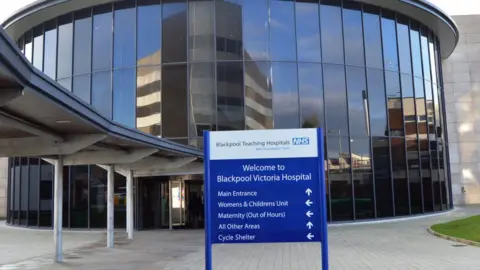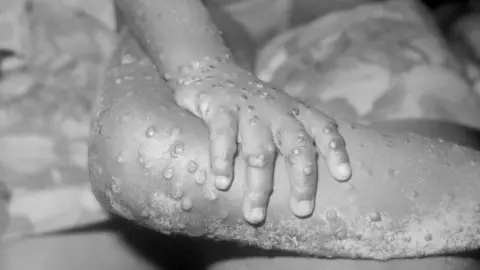Monkeypox: Blackpool hospital offered smallpox vaccines
 Blackpool Teaching Hospitals NHS Foundation Trust
Blackpool Teaching Hospitals NHS Foundation Trust Staff at a hospital where two people have been diagnosed with monkeypox have been offered the smallpox vaccine to protect against the disease.
A healthcare worker and a patient she cared for at Blackpool Victoria Hospital have both been infected, Public Health England (PHE) confirmed.
She is the third person in England to be diagnosed with the disease.
The hospital trust said it had put staff who could have been exposed to it on "active surveillance" for symptoms.
The first two cases had been patients who had separately spent time in Nigeria.
Marie Thompson, director of nursing at the trust, told the BBC Local Democracy Reporter Service the virus was "along the lines of chickenpox".
"Symptoms are flu-like and you get a rash, but people recover within a few weeks.
"We have seen [surveillance] is working in that the staff member was picked up early and is getting correct treatment."
 Getty Images
Getty ImagesShe added the hospital had been offered the smallpox vaccine so if staff developed symptoms it would make it a milder illness.
It comes as the Sun reported claims that the healthcare worker - who is being treated at Royal Victoria Infirmary, Newcastle - caught the virus changing bedding because the "pathetically small" NHS gloves failed to protect her.
Blackpool Teaching Hospitals NHS Foundation Trust has been approached for comment but is yet to respond to the allegation.
The disease was first diagnosed in the UK in a patient staying at a naval base in Cornwall.
PHE said there was no link between the first two patients, who are being treated at the Royal Free Hospital in London and the Royal Liverpool Hospital.
Initial tests showed the virus was "consistent" with the Nigerian strains of the West African clade which is less severe, it added.
